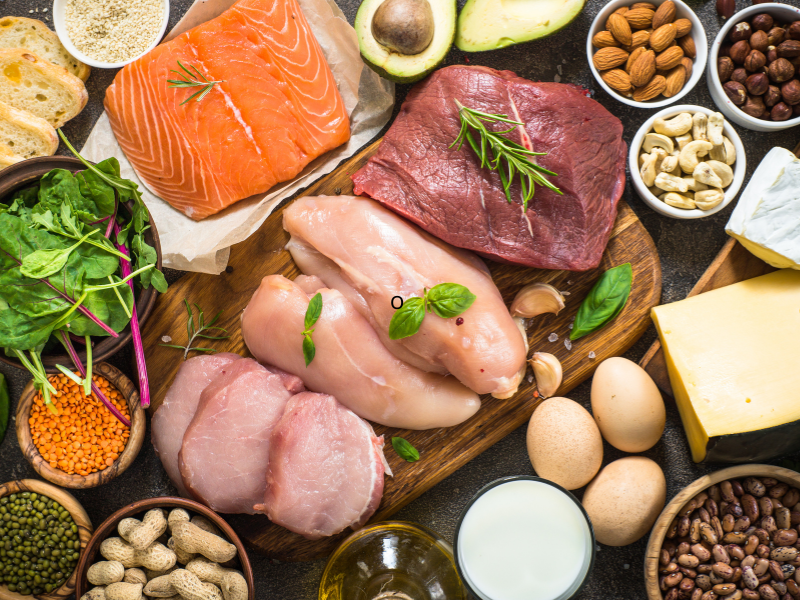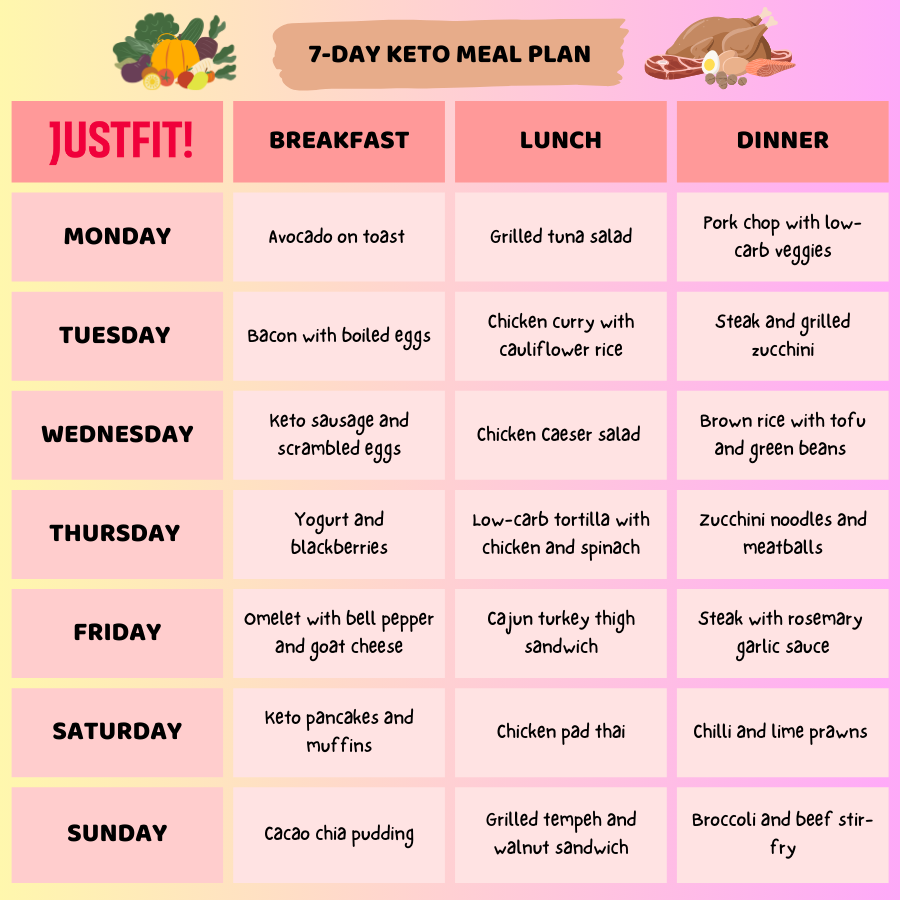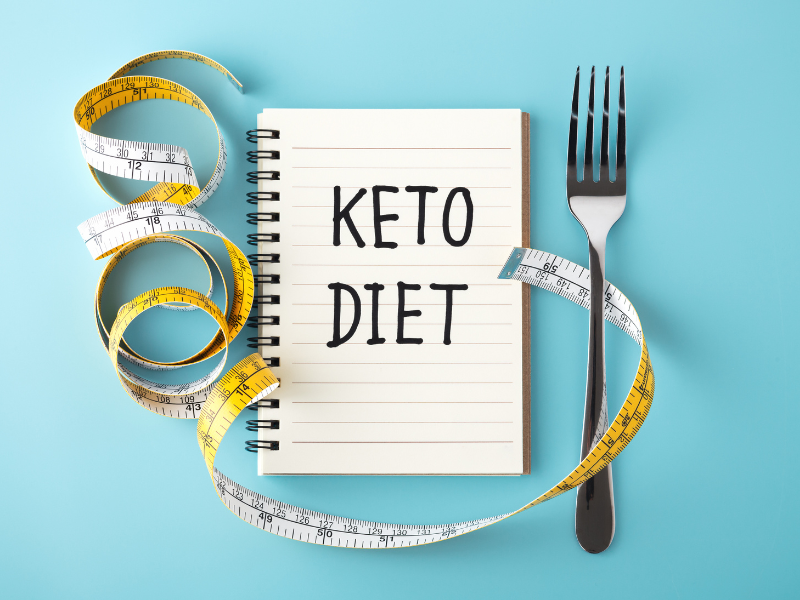




In the world of dietary weight loss strategies, the keto meal plan is making waves! Known for its effectiveness in treating epilepsy, boosting weight loss, enhancing brain health, and improving athletic performance, ketogenic diets are structured with specific macronutrient ratios of low carbohydrate intake and high-fat content to induce nutritional ketosis, which may aid in fat loss.
Curious about what the ketogenic diet is all about and whether it’s right for you? We’ve got all the answers in this article, along with a free 7-day keto meal plan to kickstart your journey!
What Is The Keto Diet?
This is a form of high-fat, low-carb diet that is low in carbs, moderate in protein, and high in fat. Keto diets are characterized by their specific macronutrient ratios, which must be approximately 5-10% carbs, 15-20% protein, and 70-75% fats. Ketogenic diets are designed to induce ketosis, which may aid in fat loss.
You may also like: Turmeric Lemonade For Weight Loss
How Does The Keto Meal Plan Work?
A sudden reduction in carbohydrate intake causes your body to shift from using glucose to relying on fats for energy, a process known as ketosis [1]. During ketosis, the liver produces molecules called ketones to serve as an alternative fuel source. Reducing carbohydrate consumption in a keto meal plan can lead to a decrease in overall calorie intake. Including low-carb veggies in your keto meal plan is crucial for maintaining nutritional balance while managing macronutrient ratios. When combined with a low-calorie diet, the keto diet is believed to help reduce appetite and effectively promote weight loss.
Foods Recommended For Keto Meal Plans
Animal Protein
- Seafood: Fish and shellfish are good choices for beginners on the keto diet menu. Salmon and other fish are not only virtually carb-free but also rich in vitamin B, potassium, and selenium.
- Meat and poultry: Fresh meat and poultry are carb-free and rich in vitamin B and several important minerals. They are also a great source of quality protein, which helps maintain muscle mass during very low-carb diets. Ensuring adequate protein intake is crucial for maintaining muscle mass on a keto diet. However, if your design is a vegan keto meal plan, these should be completely avoided.
- Egg: Eggs contain a great amount of healthy protein, with less than 1 gram of carbohydrates and about 6 grams of protein per large egg, so eggs are ideal for the plan and have also been shown to produce hormones that increase satiety.

Dairy Products And By-Products
- Cheese: Most cheeses are low in carbohydrates and high in fat, making them ideal for your meal plan. Cheese also contains conjugated linoleic acid, which is associated with fat loss and improved body composition.
- Greek cheese and cottage cheese: Greek cheese and cottage cheese are healthy, high-protein foods that you can eat with a simple keto meal plan, although they contain carbohydrates. Whether it’s cheese or cottage cheese, both have been shown to help reduce appetite and boost satiety. You can eat them on your own or combine them with chopped nuts, cinnamon, or other spices to make an easy keto meal plan.
- Sugar-free plant milk: Several plant-based kinds of milk such as soy milk, almond milk, and coconut milk are good choices. Be sure to choose the sugar-free version to avoid sugar overloading. You should also avoid oat milk as even unsweetened oat milk is too high in carbohydrates for those who are on a ketosis diet. Additionally, consider dairy-free alternatives like coconut yogurt and almond cheese.
Fat And Oils
- Olive oil: As a pure fat source, olive oil contains no carbohydrates and can be used as a base for salads or mayonnaise instead of other oils. Medium-chain triglycerides found in coconut oil are also beneficial as they are quickly absorbed and converted into energy.
- Beef tallow and ghee: Both beef tallow and ghee are good fats that can be added to your keto diet menu. Beef tallow contains only a small amount of carbohydrates, while ghee has no carbs at all!
Foods To Be Avoided in Keto Meal Plans
While you’re on the keto diet, dieticians recommend that your carb consumption must be limited to 20-50 grams a day [2]. While this might seem extreme, the diet is most efficient in this way as it burns the fat faster and also increase metabolism. In general stay away from processed food, refined carbs, and also overly sugary drinks. This list includes:
- Sugary foods like ice cream, candy, cookies, cakes, pastries, and other sweet items.
- Sweet beverages which include fruit juices, sweetened teas, soda and energy drinks.
- High-carb and starchy vegetables like potatoes, legumes, corn, carrots, lentils, pumpkin and peas.
- Fruits are deemed but include high sugar content. This includes the majority of fruits like apple, mango, oranges, grapes etc.
- Noodles and pasta,
- Rice, cereals, and oats
- Sauces and condiments like ketchup, honey mustard, BBQ, and salad dressings
- Alcoholic beverages like beer and sweet wines
7-Day Keto Meal Plan – Free PDF tool
We’ve put together this handy meal plan for the week to get you started on the keto diet journey by emphasizing the importance of planning keto meals in advance. Including low carb veggies like green beans and other delicious food like zucchini noodles and cauliflower rice in your ketogenic diet ensures nutritional balance while managing macronutrient ratios. You can download this printable tool for ideas on what to you can eat on a daily basis!
Meal prepping can be a great way to stay on track with the keto diet by ensuring you always have keto-friendly meals ready to go.

You may also like:
7-Day Keto Diet Plan for Beginners (Free PDF)
15 Delicious Low-Carb Breakfast Ideas to Try
Things To Consider About The Keto Meal Plan
Proportion Of Intake Of Various Nutrients
Under normal circumstances, in the standard keto meal plan, the macronutrient distribution is 70%-75% of fat, 5%-10% of carbohydrates, and 15%-20% of protein. Usually, the ketogenic ratio is kept at 4:1, and other essential substances for body growth and physiological activities should be added.

Duration of Keto Meal Plan
It is suggested that a healthy ketosis diet should be followed for a minimum of 2 to 3 weeks and up to 6 to 12 months for effective weight loss [3]. This diet can help turn body fat into heat metabolism, leading to weight loss. However, it is not advisable to continue with this diet indefinitely, and one must gradually ease in and out of the diet any potential negative health effects. During this period, exercise can be incorporated to increase calorie burn and to lose weight. Planning for the future and considering long-term sustainability is crucial to ensure the diet remains effective and healthy over time.
Benefits And Risks Of A Keto Diet You Should Know
After understanding the effectiveness of the ketogenic diet for weight loss plan, you also need to have a thorough understanding of its pros and cons before you begin your first step to designing your keto meal plan. Ketogenic diets, known for their low carbohydrate intake and high fat content, can induce ketosis, which may aid in fat loss. Additionally, metabolic flexibility plays a crucial role in the keto diet by allowing the body to efficiently switch between burning fat and carbohydrates for energy.
Benefits Of A Keto Meal Plan

- Weight Loss: There is evident proof of the keto diet resulting in weight loss, and also leading to a reduced appetite. The low carb, high fat diet will inevitably lead to losing calories, as well as promoting a healthier diet with less sugar and processed food. The keto diet helps in reducing hunger, making it easier to stick to the meal plan and achieve weight loss goals.
- Health benefits against diseases: The keto diet is said to help individuals with Alzheimer’s disease with their cognitive functions [4] and also aid type 2 diabetes patients with glycemic control [5].
- Maintain complete muscle mass: The weight lost during a period of keto meal plan is fat. Thanks to the protein content of this diet, muscle mass will remain intact.
- Increase healthy fat sources: Ketosis dietsare effective in lowering cholesterol and triglycerides.
Risks Of A Keto Meal Plan
- Nutritional deficiencies: A standard keto diet recipe contains fewer carbohydrates than recommended for a healthy diet and reduced sources of vitamins and minerals, which may cause malnutrition and harm the body over time. Maintaining proper fiber intake is crucial for digestive health.
- Ketoacidosis: A keto meal plan will cause excessive production of ketones in the body, and once the ketone level in the blood is too high, it will lead to ketoacidosis. This will cause nausea, vomiting, a strong taste in the mouth, and lead to dizziness, headache, drowsiness, dehydration, and other symptoms. In serious cases, it will also cause coma, cerebral hypoxia and ischemia, etc.
- Long term effects: A keto meal plan with much fat and protein may also lead to a reduction in fiber, which can cause digestive problems and constipation over time. In some cases, an unsuitable keto diet may also affect people’s memory and concentration.
- Keto Flu: When the body starts to get dependent on ketones rather than fat as a source of fuel, there can be a sense of exhausation, dizziness, fatigue, and even flu swings. This “keto flu” usually doesn’t last too long but is a possible consequence as your body adapts to a new diet.
Conclusion
The keto diet offers a valid approach to weight loss that has a range of benefits associated with it, and it does this by shifting the body’s primary energy source from carbohydrates to fats. Following a high-fat, low-carb diet results in ketosis, which can be responsible for reducing appetite and promote fat loss. But its important to approach any diet with caution and consideration of nutritional balance. Consulting with a healthcare provider or a dietitian can ensure that the keto diet aligns with personal health needs and goals. This is especially important for ketogenic diets, as they involve significant changes to your carbohydrate and fat intake. Ensuring nutritional balance is crucial for maintaining overall health while following the keto diet. If you’re in such of tips to lose weight and exercises that can add value to your lifestyle, make sure to check out the JustFit app!
What do I eat in a week on keto?
How many times should I eat a day on keto?
What are the top 10 keto foods?
What are the Keto diet plan basics?
Choy, K. Y. C., & Louie, J. C. Y. (2023). The effects of the ketogenic diet for the management of type 2 diabetes mellitus: A systematic review and meta-analysis of recent studies. Diabetes & metabolic syndrome, 17(12), 102905. Available at: https://doi.org/10.1016/j.dsx.2023.102905
D'Andrea Meira, I., Romão, T. T., Pires do Prado, H. J., Krüger, L. T., Pires, M. E. P., & da Conceição, P. O. (2019). Ketogenic Diet and Epilepsy: What We Know So Far. Frontiers in neuroscience, 13, 5. Available at: https://doi.org/10.3389/fnins.2019.00005
Harvard School of Public Health. (2024, May 9). Diet Review: Ketogenic Diet for weight loss. The Nutrition Source. Available at: https://nutritionsource.hsph.harvard.edu/healthy-weight/diet-reviews/ketogenic-diet/#:~:text=The%20ketogenic%20diet%20typically%20reduces,and%2010%2D20%25%20protein.
Kirkpatrick, C. F., Bolick, J. P., Kris-Etherton, P. M., Sikand, G., Aspry, K. E., Soffer, D. E., Willard, K. E., & Maki, K. C. (2019). Review of current evidence and clinical recommendations on the effects of low-carbohydrate and very-low-carbohydrate (including ketogenic) diets for the management of body weight and other cardiometabolic risk factors: A scientific statement from the National Lipid Association Nutrition and Lifestyle Task Force. Journal of clinical lipidology, 13(5), 689–711.e1.Available at: https://doi.org/10.1016/j.jacl.2019.08.003
Masood, W., Annamaraju, P., Khan Suheb, M. Z., & Uppaluri, K. R. (2023b, June 16). Ketogenic diet. StatPearls [Internet]. Available at: https://www.ncbi.nlm.nih.gov/books/NBK499830/
Tabaie, E. A., Reddy, A. J., & Brahmbhatt, H. (2021). A narrative review on the effects of a ketogenic diet on patients with Alzheimer's disease. AIMS public health, 9(1), 185–193. https://doi.org/10.3934/publichealth.2022014





